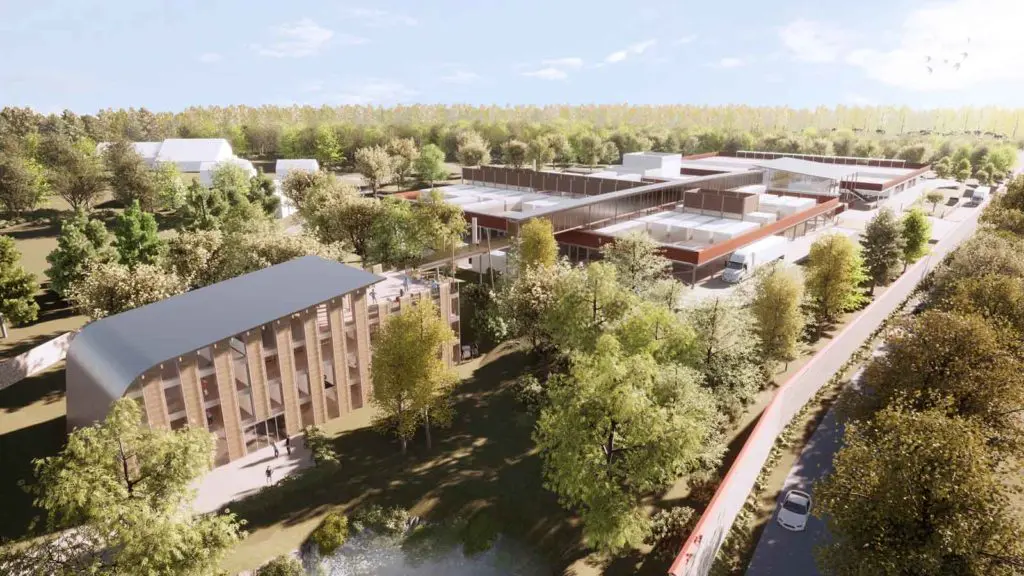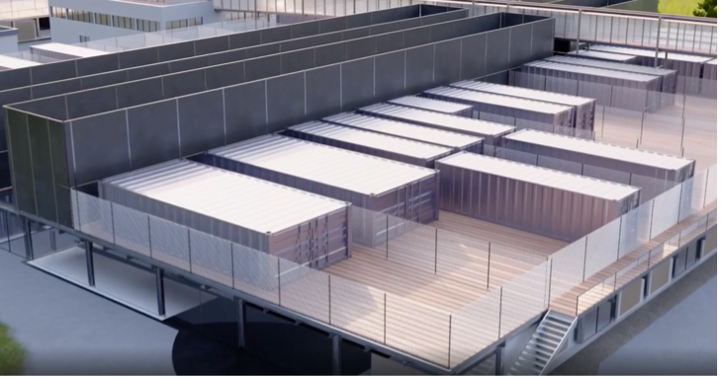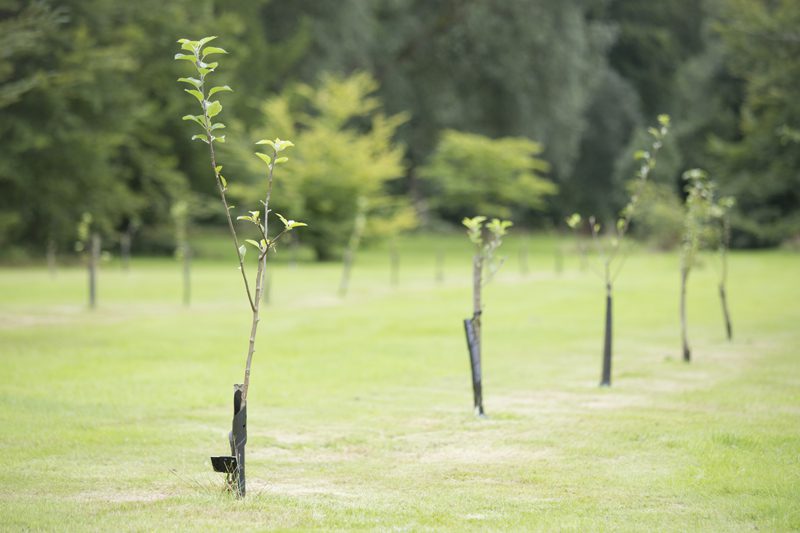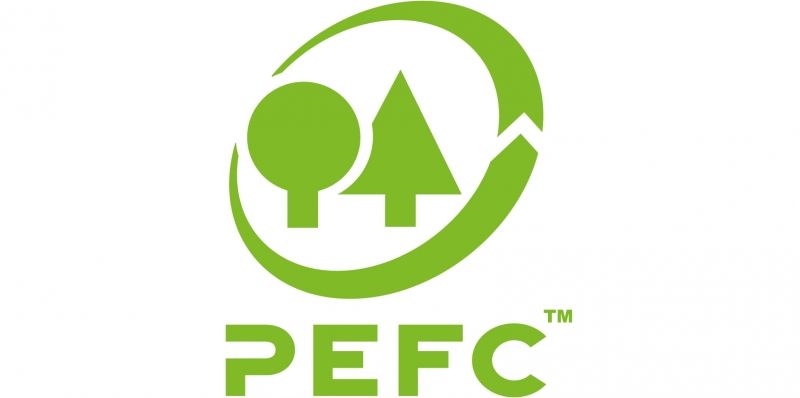Environment
Conscious of our company’s social responsibility, we have developed ECLAIRION as a decarbonized environment to meet computing needs capable of supporting and promoting environmental transition.”
Innovative, this data center dedicated to colocation hosting of high-density computers within container modules minimizes the use of materials: it is the result of advanced thinking in terms of efficiency and reversibility.
From the outset of its operation, ECLAIRION is committed to complying with all current management system standards.
Located between a forested area and a 12th-century castle, the ECLAIRION data center has been designed with a clear architectural approach: to synthesize high technology with the utmost respect for nature. To achieve this, the installations are fully dismantlable or convertible for different functions at the end of the site’s operation.

The land on which ECLAIRION stands does not include a building envelope that significantly reduces the project’s environmental impact. In alignment with the local urban planning of the municipality of Bruyères-le-Châtel, it comprises a buildable area of three hectares and a natural area of one hectare: this hectare serves to facilitate the transition between the urban zone and the forest.
In contrast to the concrete cathedrals that currently house the majority of data centers, ECLAIRION has chosen to use reusable materials (metals for the piles and container modules) in its design.
Four 2500 m2 Platforms
In order to minimize soil artificialization as much as possible, the infrastructure consists of a canopy supported by a forest of 3.50 m metal poles. It is organized into four separate platforms of 2500 m2 each, capable of accommodating container modules containing high-density computers

The metal poles, completely deconstructible, enable a permanent adaptability of the concept without affecting the existing structure: uses are continuously flexible thanks to the container modules, which can also adapt to any, even rapid, technological advancements (performance improvement, increased IT power, miniaturization, etc.). Each platform can thus be dismantled independently of the others, and its area can be returned to nature.
The metal poles, completely deconstructible, enable a permanent adaptability of the concept without impacting the existing infrastructure: uses remain flexible at all times thanks to the container modules, which are also capable of adapting to
all technological advancements, even rapid ones, (performance improvement, increased IT power, miniaturization, etc.). Each platform can thus be dismantled independently of the others, and its area returned to nature.
The container modules placed on the four platforms are both reusable and mobile. The two buildings, one dedicated to the activity on three levels and the other to logistics, are made from bio-sourced materials, inherently low-carbon. Only the logistics building has a concrete basement, which can be used for occasional storage of client equipment.
ECLAIRION thus claims absolute modularity, minimizing any impact during potential downtime of its facilities: when its container modules are not in use, their energy consumption is zero. On the site, water management is simplified through retention basins and vegetated swales.
Reduced Noise and Visual Disturbances
ECLAIRION adheres to the limits of acoustic emissions at the property boundary, thanks to a noise-reducing enclosure around the cooling and heat dissipation machinery: +3 dB at night, +5 dB during the day. The entire setup is enclosed and equipped with sound traps above the machines. Beyond its high-security fence, the site features sound-absorbing walls to mitigate potential noise disturbances.
ECLAIRION is also concealed from public view, both to prevent visual pollution and for security reasons. Sound-absorbing walls are constructed to prevent noise disturbances, and a high-security fence is installed. A six-meter-wide area planted with thorny vegetation surrounds the entire perimeter of the site, along its fence, serving as a wildlife refuge while also acting as a natural barrier.
As a result, the land on which ECLAIRION is built does not host any building envelope that significantly reduces the project’s environmental impact. In alignment with the local urban planning of the municipality of Bruyères-le-Châtel, the site comprises a buildable area of three hectares and a natural area of one hectare: this hectare serves to facilitate the transition between the urban zone and the forest.


Limited Consumption on the Site
ECLAIRION ensures a 100% decarbonized power supply for the site, with 50% of it covered by green renewable energy with a French Origin Guarantee. ECLAIRION is committed to complying with the Energy Efficiency Directive (EED): as the operator of a data center, we will report annually on energy performance details, including energy consumption, capacity, and the use of renewable energy, storage and network traffic, water usage, and other critical data. ECLAIRION is committed to achieving a very low PUE (Power Usage Effectiveness), thanks in large part to site consumption limitations and the performance achievable by container modules utilizing the latest cooling technologies.
The Certifications and Labels of the ECLAIRION Site
Our environmental commitments, which have been a top priority since the site’s design phase, align ECLAIRION with several certifications and labels, including the French HQE Sustainable Infrastructure certification for the entire plot and the American LEED (Leadership in Energy and Environmental Design) certification.


Regarding the activity and logistics buildings, if the building permit was submitted under the RT2012 regulations, they were constructed to achieve level E3C1.
ECLAIRION also holds the “PEFC” label, which ensures the origin of the wood used in the site’s construction.
Starting from the launch of site operations, ECLAIRION will align itself with all applicable performance management systems.
A first set of normative and regulatory reference frameworks, currently under review, has been defined:
- ISO 27002: Information Security: Cybersecurity and Privacy Protection
- GDPR: Compliance with the European General Data Protection Regulation
- II 901 & ZRR: Enhanced Requirements for Restricted Data and Sensitive Site
- ISO 14001/5001: Environmental Impact Study of the Site, Energy Consumption
- HDS: Enhanced Requirements for Health Data Protection
- TPN: Trusted Partner Network (a label issued by the Motion Picture Association for best practices in content security management).”

